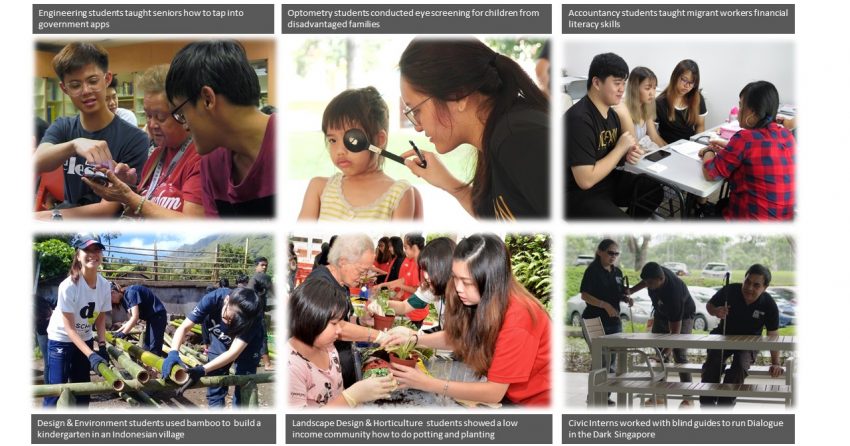Ngee Ann Polytechnic’s Service-Learning Programme (Singapore)
Ngee Ann Polytechnic (NP) has 14,000+ students and offers 39 full-time diploma courses through 9 academic schools.
In 2016, NP launched Service-Learning (S-L) as its signature pedagogy, becoming the first tertiary institution in Singapore to strategically integrate S-L into its core curriculum. All students participate in at least one Service-Learning activity or project, tied to an academic module, applying the skills and knowledge from their course of study to address community issues. Service-Learning enables NP to advance its desired graduate outcomes — big-hearted students who are passionate learners and globally smart professionals — while making a positive impact on society.

S-L instructors consult and work with community partners, who are regarded as co-educators, to ensure that projects meet identified community issues whilst achieving modules’ learning objectives; they endeavour as much as possible to utilise an Asset Based Community Development approach that taps into strengths within communities. The projects cover diverse areas such as education and employability, eldercare and active aging , health, environment, and community development. Students are encouraged to play a role in shaping their S-L projects. They can also continue Service-Learning via final-year or passion projects, civic internships, and overseas community projects.
From academic years 2016 to 2019 , the programme saw more than 16,800 students work on some 150 projects involving over 70 partners. Over 400 academic staff have been trained in S-L. In 2019, more than 500 final-year students continued S-L via civic internships, using their professional skills for social good. Annually, more than 600 students embark on over 25 international S-L projects.
Strategies to strengthen and deepen NP’s S-L programme include scaffolding additional S-L modules over semesters, across disciplines, longitudinally over time, across borders, and after graduation. A new Social Leadership & Service-Learning Pathway is being established to develop students’ capacity and desire to work with others to strengthen society and find solutions to social challenges. S-L Specialists are also being developed within schools to decentralize expertise and embed it in the context of academic disciplines, thereby enhancing schools’ capacities and enabling a more sustained level of institutionalization of S-L.